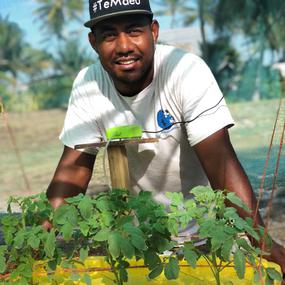29 year-old Eritai Kateibwi grew up on the remote island of Marakei, Kiribati, located 2,500 miles southwest of Hawaii.
He currently resides, with his wife, Tabaraoi, on Tarawa, the capital of the island republic of Kiribati.
As a young adult member of The Church of Jesus Christ of Latter-day Saints, he accepted an invitation in 2009 to serve a two-year mission for the Church in the Hawaii Honolulu Mission.
While on his mission he learned that serving others not only helped those he reached out to, but also brought joy and fulfillment to his own life.
For two years he looked for ways to assist members and friends in the communities in which he resided, as well as teaching the restored gospel of Jesus Christ.
After returning from his mission he attended Brigham Young University Hawaii graduating with a degree in finance.
Upon graduating, he organised a local charity called Te Maeu, a food sustainability program that employs portable, self-contained hydroponic gardens (a method of growing plants without soil, using mineral nutrients in a water solution).

Tarawa, Kiribati, is one of 32 atolls and isles in the central Pacific. Because of its location along the equator, weather conditions are harsh and defined by heat and humidity.
Hot, salty sea breezes, sea water intrusion that destroys crops and contaminates water, and the lack of soil and space present difficult challenges when it comes to growing nutritious food.
A lack of nutritious food along with imported rice and sugary foods have contributed to malnutrition and disease that have become widespread for islanders who dwell in Kiribati.
As in other Pacific islands, Type 2 Diabetes is epidemic. Along with the disease come the devastating consequences of blindness, heart disease, foot ulcers and amputation.
The problems that dominate the low-lying atolls seem insurmountable to some, but a challenge to overcome for others.
“People tell us to abandon our country to the sea,” says Kateibwi. “But my generation wants to stay. We have gone away to be educated, and now we are coming home to make a difference.”
His energy and vision have created the sustainable program that teaches local Kiribati families how to grow wholesome fruits and vegetables using hydroponics.
In a hydroponic garden plants grow quickly producing a crop in 30 days. Solar powered pumps keep the nutrients flowing to the roots.
| Temple Square is always beautiful in the springtime. Gardeners work to prepare the ground for General Conference. © 2012 Intellectual Reserve, Inc. All rights reserved. | 1 / 2 |
New hydroponic farmers are provided equipment and training to grow their own vegetables and how to sell the excess.
Full-time humanitarian missionaries, Daniel and Rebecca Kitchen, serving in Tarawa for the Church, have been supporting the efforts of this caring and bright young man’s cooperative through LDS Charities.
The missionary couple describe Eritai as a warm and likeable young man who loves his fellow Kiribati countrymen. “If Eritai says he will do something, it gets done,” said Rebecca.
“We believe his traits of unselfishness, warm personality and hard work represent the good in Kiribati.”
In 2017 he won the United Nations Young Champion of the Earth competition. He was awarded $15,000.00 USD in prize money to use as he saw fit. Rather than using the money for his own benefit, he used it to fund his charity, Te Maeu.
A service organisation in Utah, USA, has offered funding to this project that is the brainchild of Eritai Kateibwi.
Along with running his cooperative and being a husband, Eritai also serves in his Latter-day Saint congregation in Toaerereke as an assistant clerk.
He relaxes and recharges his spirit by going spear-fishing late at night in his beloved Kiribati waters, then returns energized to help his fellow countrymen.
Watch a short video on Food Production and Nutrition
Mormons believe that education is key to becoming a better influence for good in the world.